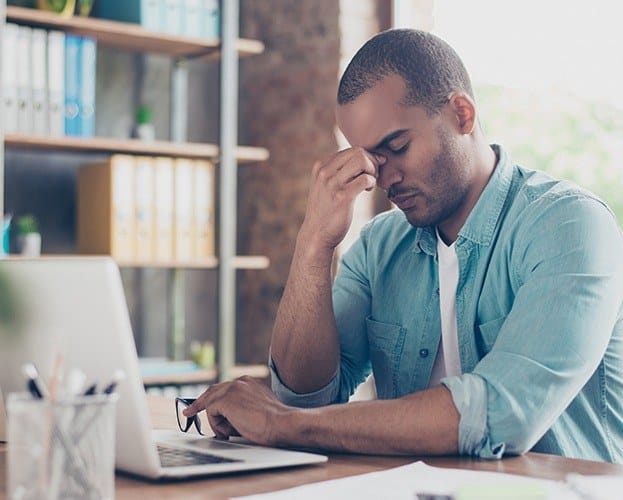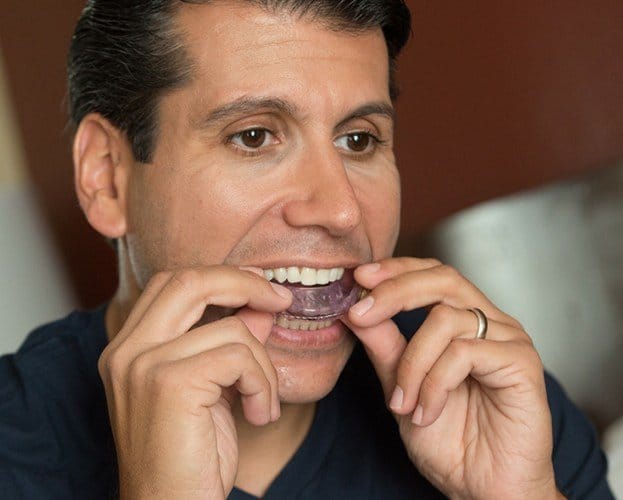Sleep Apnea Therapy – Leesburg, VA
Finally Get the Rest
You Deserve
Over 20 million. That is how many Americans are dealing with sleep apnea right now, and if you’re one of them, then you know how the disorder can impact every aspect of your life. With sleep apnea therapy from Dr. McBryde at All Smiles Leesburg, you can finally overcome the fatigue, stop snoring, and look forward to mornings again. To learn more so you can start sleeping better soon, contact us today for sleep apnea therapy in Leesburg, VA.
Why Choose All Smiles Leesburg for Sleep Apnea Therapy?
- Custom-Designed Sleep Apnea Appliances
-
Help Stop
Chronic Snoring - Can Prevent Teeth Grinding & Headaches
What is Sleep Apnea?

Obstructive Sleep Apnea (OSA) is a sleeping disorder in which breathing comes to a halt for ten seconds or longer. This cessation of breathing typically occurs multiple times throughout the night. People who struggle with sleep apnea may experience the following symptoms:
- Difficulty breathing while sleeping/gasping or choking
- Loud or obstructive snoring while sleeping
- Waking with a headache or sore throat
- Feeling excessively drowsy, both when you wake and throughout the day
- Difficulty concentrating or staying awake throughout the day
Is Sleep Apnea Dangerous?

The effects of sleep apnea go beyond disrupted sleep. When left untreated, sleep apnea has the potential to lead to the following conditions and disorders:
- Stroke
- High blood pressure
- Irregular heartbeat and increased risk of heart attack or failure
- Headaches
- Depression
- Diabetes
Sleep Apnea Treatment Methods

For patients with mild cases of sleep apnea, lifestyle changes may successfully help treat the condition. Some that may be recommended include:
- Losing weight
- Exercising regularly
- Limiting alcohol intake
- Quitting smoking and other forms of tobacco use
- Avoiding sleeping on back
For patients with moderate to severe cases of sleep apnea, more intensive intervention is often required. Many people find success with the use of a Continuous Positive Airway Pressure (CPAP) machine, which delivers a constant supply of air and assists with breathing while sleeping. While the CPAP machine can be incredibly beneficial, some people may not be tolerant of this method of treatment. In this circumstance, a custom sleep apnea appliance will be created for you.
Oral Appliance Therapy

Oral appliance therapy involves a patient wearing a specially-designed mouthguard to bed that slightly shifts the lower jaw forward, which opens the airway and prevents it from closing. Our dental office uses the Tap3 and DreamTap appliances, which have proven successful for countless patients while offering supreme comfort. This approach offers several advantages compared to traditional CPAP therapy, as oral appliances are easy to use, make no sound, and require almost no maintenance to last for several years.
Sleep Apnea FAQs
What Are Major Risk Factors for Sleep Apnea?
Although sleep apnea can impact anyone, patients who are or have any of the following are at an increased risk of sleep apnea:
- Over the age of 65.
- Pregnant woman.
- Overweight or obese.
- Excessive alcohol consumption.
- Smoking habit.
- Small neck circumference or narrow airway.
Especially if you or your partner fits in any of these descriptions, be on the lookout for any signs of sleep apnea that could be causing your symptoms and putting your health at risk.
Do I Have to Snore to Have Sleep Apnea?
No, snoring is not a required symptom of sleep apnea. It is one of the most common signs of the condition, but you could have it and not snore. Along the same lines, not everyone who snores has sleep apnea. It’s more important to look at your overall health and the quality of your sleep to determine whether you should be evaluated for sleep apnea.
How Do I Know If I Have Sleep Apnea?
Even if you exhibit multiple symptoms of sleep apnea, the only way to know for sure is to undergo a sleep test with a specialist, who can see, measure, and record lapses in breathing during the night. Once you’ve been officially diagnosed, we can begin treatment with an oral appliance. If you aren’t sure if you should have a sleep study done, don’t hesitate to bring up your concerns during your normal dental appointment with Dr. McBryde. We can screen you for this condition and refer you to a local specialist for testing if necessary.
How Soon After Treatment Begins Should I Notice Improvement?
With CPAP therapy, it can take a while to get used to wearing a mask while you sleep. In fact, some can find it just as disruptive as sleep apnea itself. If you have a new sleep oral appliance, you may need a couple of nights to adjust to it. Although repeating a sleep test is the only way to know for sure whether treatment is working, you may notice improvement in your symptoms right away with an oral appliance.
Am I a Good Candidate for a Sleep Oral Appliance?
Oral appliance treatment is primarily intended to treat mild to moderate sleep apnea. However, some patients with higher severity benefit from taking advantage of both CPAP and an oral appliance. Solutions will vary based on the patient’s individual needs, lifestyle, and severity of the condition.
